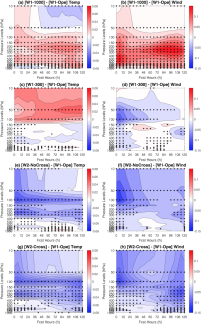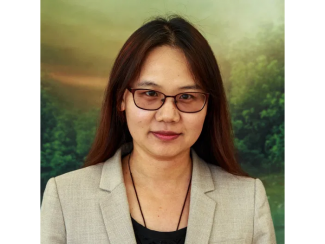Dr. Xuguang Wang is a Robert Lowry Chair Professor and Presidential Research Professor of School of Meteorology of University of Oklahoma. She leads a Multiscale data Assimilation and Predictability (MAP) lab. Her MAP research includes (a) developing new techniques and novel methodologies for data assimilation and ensemble prediction; (b) applying these techniques for global, hurricane, and convective-scale numerical prediction systems that assimilate a variety of in-situ and remote-sensing observations to improve predictive skill; (c) improving the understanding of atmospheric predictability and dynamics through data assimilation and ensemble approaches from global to storm scales; and (d) interdisciplinary research such as leveraging machine learning to improve data assimilation and ensemble prediction.
Over the past 10+ years, Dr. Wang and her MAP team have been actively working on transitioning their data-assimilation research and development on hybrid 3D and 4D EnVar into NOAA NWS operational numerical weather-prediction systems: GFS, HWRF, and HRRR, in collaboration with NOAA research and operational centers. Dr. Wang is also excited about cultivating the next generation in data assimilation. So far she has directly advised 25 students and 19 postdocs on data-assimilation research during her tenure at OU.
Close collaboration with NOAA research and operation centers is essential for effective research-to-operation (R2O) transitioning. While regular research grants typically only enable short visits to collaborate, the DTC Visitor Program allowed Dr. Wang a lengthier visit at NOAA/NCEP/EMC during her sabbatical in Fall 2018. The visit was hosted by Dr. Vijay Tallapragada, chief of the Modeling and Data Assimilation Branch of EMC. The objectives of her visit were to collaborate further with EMC scientists on data-assimilation research and development, and to facilitate the transition of recent data assimilation development of her MAP team into NWS operational global, hurricane and convective-scale prediction systems. During her visit, Dr. Wang also discussed new ways to broaden collaboration between academia and NOAA with the late Dr. Bill Lapenta, then NCEP director, and Dr. Brian Gross, EMC director.
The visit accelerated the development of a multiscale data-assimilation approach in the 4DEnVar data assimilation system for the UFS Medium-Range Weather Application (Huang et al. 2020). This approach allows more effective updating of all resolved scales using all observations at once and therefore improves global forecasts (Fig. 1 below). The visit also expedited transitioning the capability of directly assimilating ground-based radar observation developed by MAP into the operational HRRR (Johnson et al. 2015, Wang and Wang 2017), and the operational HWRF (Lu et al. 2017). Beginning in 2020, these direct ground-based radar data-assimilation capabilities became operational in HRRR and HWRF, as a result of multi-institutional collaboration (OU/MAP, NOAA/NCEP/EMC, NOAA/ESRL/GSL and NOAA/AOML/HRD). These capabilities will be further integrated with the UFS hurricane and convection-allowing modeling (CAM) applications down the road.
Looking into the future, Dr. Wang and her research team at OU plan to continue their basic research to develop novel data-assimilation algorithms that treat non-Gaussianity, new multiscale data-assimilation algorithms (Wang et al. 2020) for weather, and assimilation at the interface between different earth-system components (i.e. coupled data assimilation). They will extend their research and development to enable the effective assimilation of in situ, radar and satellite observations. They will further their work with operational NWP agencies to broaden the impact of basic research through effective R2O. Training the next-generation workforce is critically important for advancing the entire data assimilation field. Dr. Wang strives to continue advancing this effort by advising students and early career scientists.

